LGBTQ firefighter who saved lives in Turkey on the beautiful thing her interpreter said to her
Exclusive: "I spoke to my interpreter who is a Muslim woman. And I said to her ‘I'm LGBT+. Is this an issue?’ She said, ‘No. You've left your home country to come and help my people.'"

An LGBTQ officer of the London Fire Brigade has opened up about her experiences helping out in the aftermath of the devastating earthquake in Turkey.
More than 50,000 people in Turkey and Syria have died in the month since the 7.8 magnitude earthquake struck. The BBC reports that 1.5 million people are homeless.
But within hours, the international community sprang into action.
Tracy Doyle, a Temporary Sub Officer at London Fire Brigade, was one of the 77 International Search And Rescue (ISAR) team members who scrambled to respond.
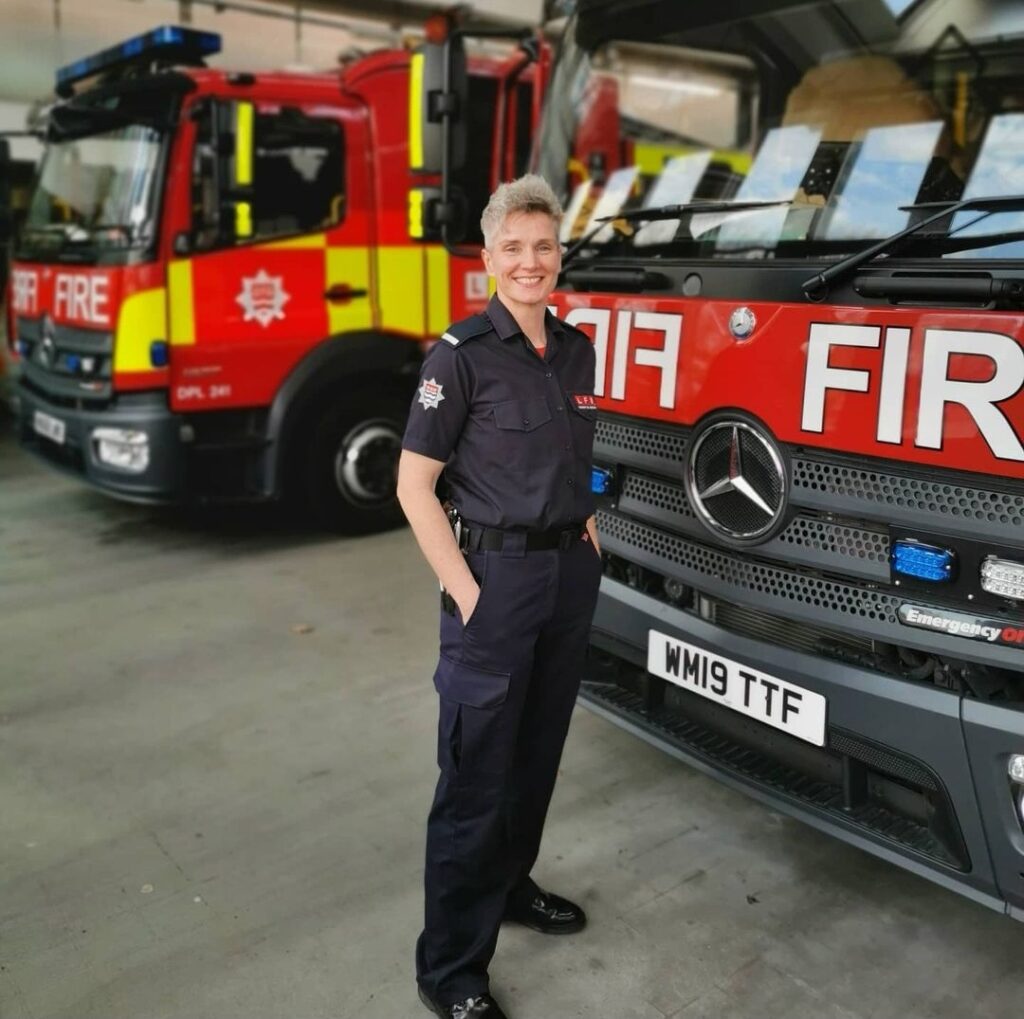
As a member of the Urban Search and Rescue (USAR) team and ISAR, Tracy is trained to respond rapidly. But Turkey was something different, as Tracy explained when she recently spoke to Attitude about her experiences and how she’s adapted to life back in the UK.
She also shared the beautiful moment she had with her interpreter in a country where attitudes towards the LGBTQ are not the most welcoming.
“It was nothing I’d ever seen or trained for in my entire career as a firefighter”
What was the timeline between getting the call and going out to Turkey?
I’d taken a night off the night before [6 February] to go and see my girlfriend. We hadn’t seen each other for a couple of weeks because of our shifts. So, that was a nice surprise that evening for her. The next morning I had to get myself down to London. Even though we were flying out of Birmingham where my other half lives quite close by. I had to go back to London, get all my equipment, and then go back to Birmingham. And that’s where we met all the ISAR operatives. 77 of us that went to Turkey. Our mission was basically to save lives.
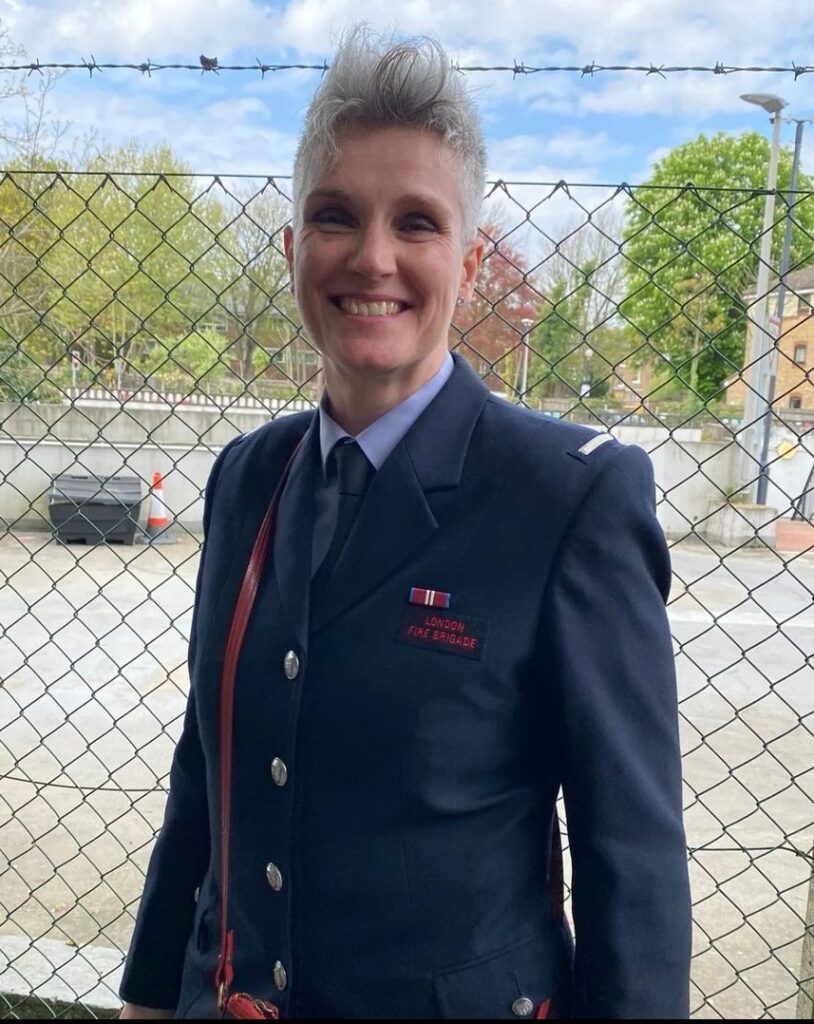
What was it like when you arrived?
It was nothing I’d ever seen or trained for in my entire career as a firefighter. When we do our training, it’s based on scenarios like a tsunami or earthquake. But we can’t really re-enact that because we don’t have that structure here to work from within the UK. So, for us to go out to Turkey and see complete devastation was nothing I’d ever seen or trained for. Because of the circumstances in Turkey, some of our equipment became obsolete, all we were doing, in the end, was using our hands, using bolt croppers, hammers, and chisel. And if we did have something, maybe drills to make our access through into where the casualties were. We had to be really mindful of the equipment we used because of the aftershocks that we continually had out there.
“You kind of go into work mode, you switch off”
How long were you out there for?
Nine days. We set up camp at the Hatay Stadium and then we had everybody ready to go out and just start their patrols. We went out to look for live casualties, that was our briefing. It was like looking for a needle in a haystack.
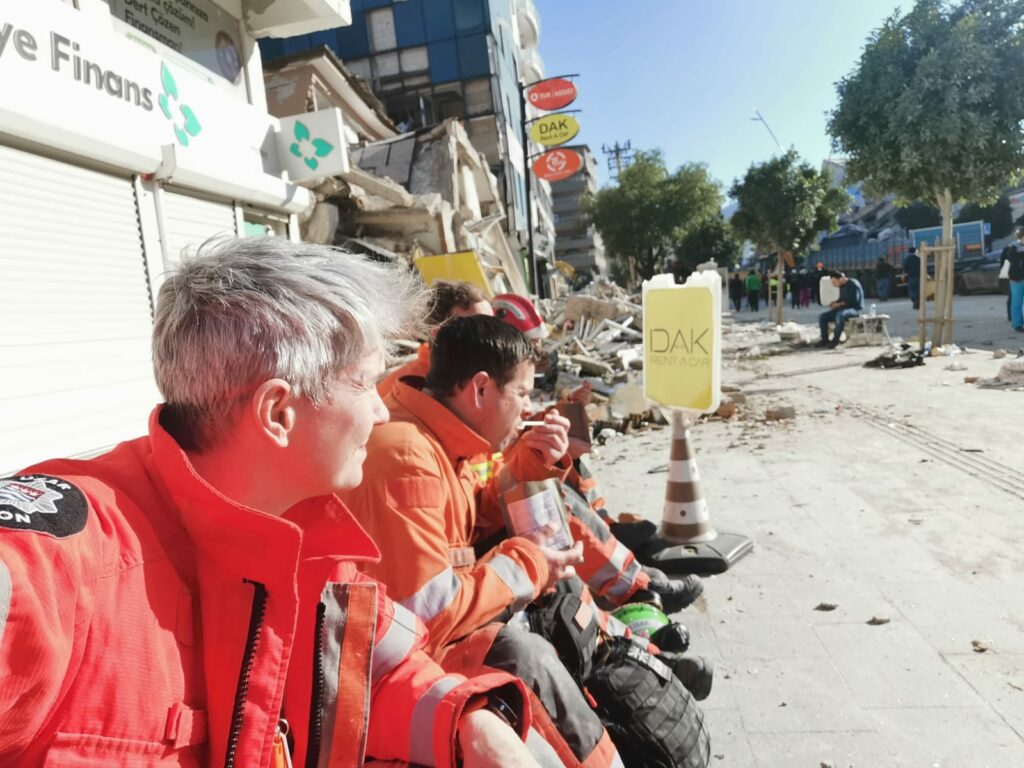
Did you feel prepared?
Prepared for what we’d see trauma-wise, I don’t think so. I gave up counting bodies after 20 because there were just so many. And unfortunately, they didn’t have enough body bags for the people that had lost their lives. So, they were wrapped up in bath sheets or bedsheets or blankets. I think you kind of go into work mode, you switch off. I felt quite numb from it.
When we went back to our tents later on that night to get our heads down, I just couldn’t sleep, we just couldn’t switch off because our adrenaline was literally constantly going for nine days. Training-wise, with USAR and ISAR with building collapse, it was nothing we’d ever trained for. We’ve gone into collapsed structures before in London, we’ve shored [them] up and we’ve got people out, but with this, everything was damaged or razed to the ground. It was just unprecedented. It was devastating and catastrophic.
“I remember one of the doctors actually cried herself to sleep and then would wake up crying”
As one big unit were you all able to support each other?
Yes, we all stuck together, kept an eye on people if their heads went down a little bit, you know, ‘how are you doing?’ There were a few of us that gave each other morning hugs, afternoon hugs and evening hugs. It was just something so simple that you could give somebody, just a couple of seconds. I know the doctors that were there, and some of the nurses, they were right in with the casualties. They were very affected by it.
I remember one of the doctors actually cried herself to sleep and then would wake up crying. But it became the norm. I know that’s quite odd to say. But from the first day of being shocked into seeing this complete devastation and loss of life everywhere. Then as every day went along, you just kind of looked at it as normal. Now I’m back in the UK, I have this guilt that I’m here and everything’s okay and they have nothing. Most of the team is like that, actually.
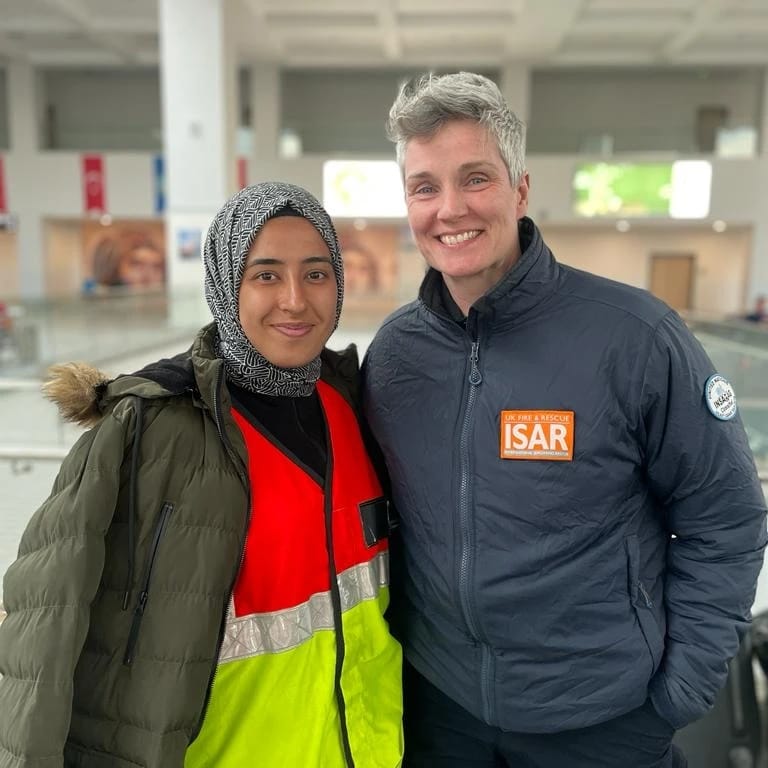
Were there any moments of hope or positivity that kept you all going?
Yes, we had a couple of incidents with the last two casualties – a man and a woman – that we found alive on day five. And we basically worked out a way to tunnel through one side of another building to get through to them. It was impossible to use the specialist equipment that we had so basically, we got an interpreter to shout out [to them]. It took around 17 hours in total to actually get those two out. They were both fit and well, obviously dehydrated and a little bit worse for wear, but they survived. They were just so grateful to come out.
On another occasion when we were in the Hatay stadium. We had refugees staying on the other side of the stadium and we had a little two sisters and their older brother come onto the football pitch and kick a football with a couple of the ISAR team members. I took the girls over to meet the dogs and we stood there with a couple of our team members and said for everything we’ve seen this last week, just to see these kids play for an hour is worth every moment.
“I don’t think any kind of training or any length of service can prepare you for what we came across out in Turkey”
Have you been able to access support in terms of dealing with some of the stuff that you had to experience?
Yes, we had our debrief last week, and we had a counselling person there. We all spoke within the London team. I have a counselling session tomorrow. So, it’s pretty quick. And they’re really on it because of the trauma that we saw. I hope to god, I never see anything like that ever again in my life. I’ll definitely go to help again. But I don’t think any kind of training or any length of service can prepare you for what we came across out in Turkey. It was shocking. Thankfully, we had an amazing interpreter called Gamze, who was a 24-year-old schoolteacher that basically gave up her time to come and help us, and without her, we wouldn’t have got to half the people that we saved.
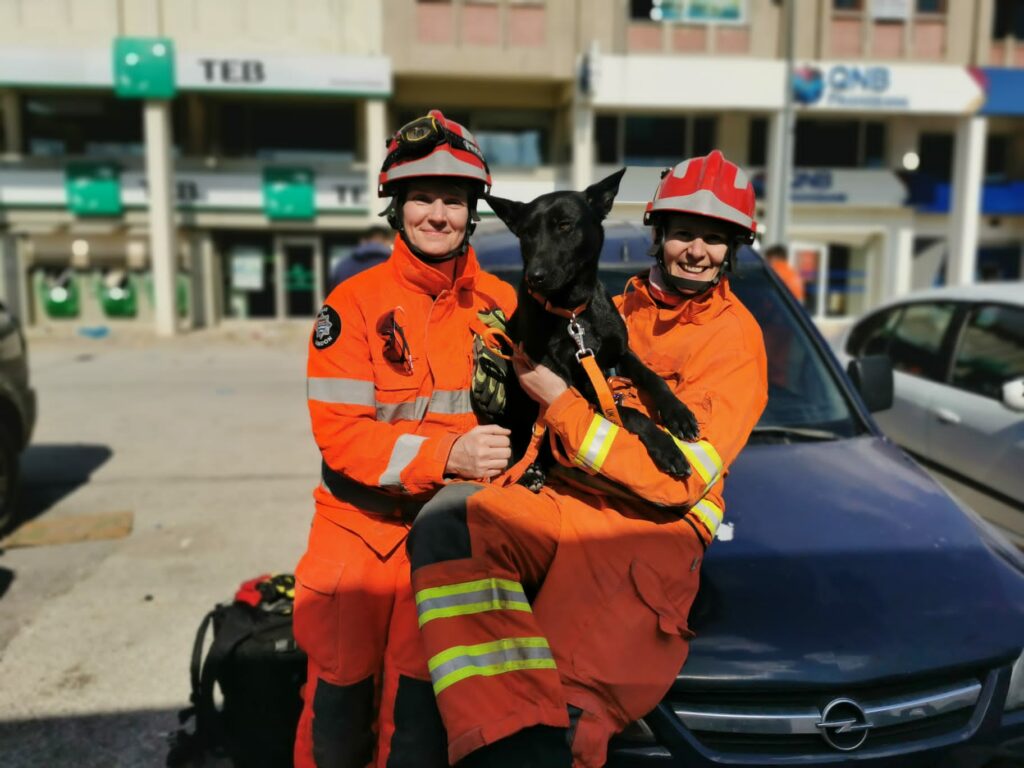
How have you found coming back to the UK?
I feel quite guilty. We’re very privileged in this country. When you come back from something so devastating, even just to have a roof over your head is something that people in Turkey would love to have now. I think it’s odd that everybody else is going about their business and that it’s dropped off the news. People are still struggling out there. They have nothing. And yeah, I found it very hard to recover. I had a massive adrenaline dump, which everybody had.
I’m still recovering from that now because your adrenaline was going continually for nine days. And it’s only when getting home. And then you know that that’s it. Nothing else is happening. That’s when your body just goes into kind of sleep mode, and you don’t do anything else. I was absolutely shattered just going for a walk. It’s been hard coming back because you just wish you could have done more but we did everything we could.
“Be kind and support people because they haven’t got anything”
The situation is still ongoing in Turkey. Are there any plans for the team to go back?
Nothing has been said at this moment in time. I think they’re focusing on us to have counselling and advisory support. We have another meeting in probably 21 days now to see where we are mentally and physically. And if we need a timeout, they will grant us the timeout from work. It’s nice to be back. But I do keep thinking about one particular moment when I was out there that wasn’t very nice. That’s what our advisor and counselling are for so they will help me through that.
What would you say to people now about what they can do to help the situation?
Donate. If they can donate a pound, five pounds, or even a sleeping bag or tent. I went into a well-known outdoor surplus store the other week because when I was out there, our interpreter didn’t have anything to sleep in. So, I gave her one of my sleeping bags and the liner. I went to this outdoor place, and I asked him what they were going to do as a result of the earthquake in Turkey. They actually said that they were supplying tents, sleeping bags, and other camping equipment to help families out there.
They need all the support that they can get. Everything from clothes, tents, children’s shoes, everything. People were in bed at 4 am when that earthquake struck, and they have nothing apart from the clothes they were wearing. We were based in Turkey; we didn’t go to Syria for obvious reasons. But people in Syria are in desperate need as well. If you can donate or get together with your community and just collect clothes or something. Just to be kind and support people because they haven’t got anything.
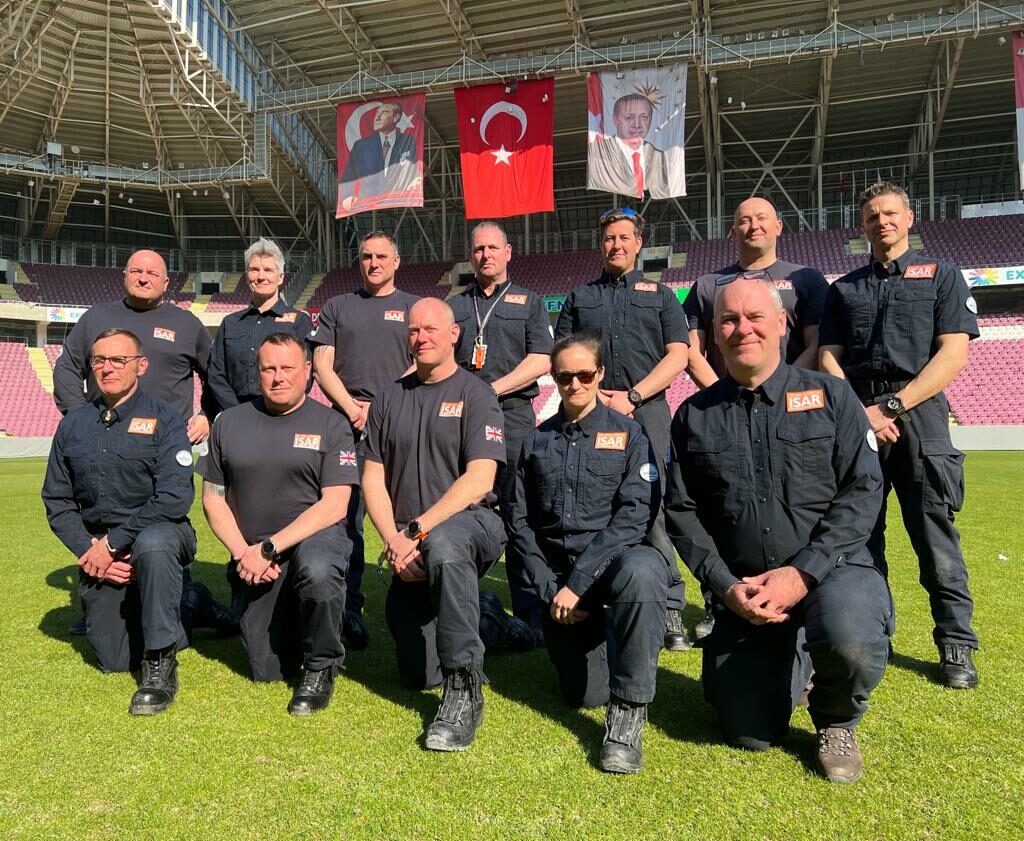
Turkey isn’t the most welcoming place for LGBTQ people are the best of times. Was that ever a concern?
We were briefed about local customs beforehand and told how to adhere to them. We all respected these. I spoke to my interpreter who is a Muslim woman. I said to her ‘I’m LGBT+, is this an issue?’ She said, ‘No. You’ve left your home country to come and help my people. It doesn’t matter what your orientation is. That’s not important.’
Is there a moment that will stick with you?
There are some bad ones that I found very hard and very traumatic. But my interpreter Gamze, who I’m now friends with, said that out of the awful devastation god had sent her sent me as her friend. We’re in contact every other day just to make sure she’s okay and she’s surrounding herself with good friends and family. So that’s a plus really.
